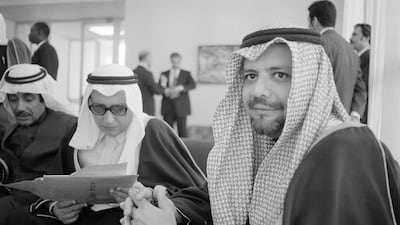Sheikh Ahmed Zaki Yamani, a former energy minister of Saudi Arabia who steered the kingdom's oil policies for nearly 25 years, has died in London. He was 90.
He will be buried in Makkah, where he was born. Sheikh Yamani was one of three children born to Hassan Yamani, a respected scholar of Islamic law and former grand mufti in Indonesia. His paternal ancestors came from Yemen.
"It is shocking; we still don't believe it. It takes time," Mai Yamani, 64, the eldest of his children, who was by his side when he died, told The National. "Even with all the machines around him in the hospital, he was majestic."
Sheikh Yamani served as minister of petroleum and mineral resources from 1962 to 1986 and was an influential figure in the kingdom and in Opec.
He earned a bachelor’s degree in law from Cairo University in 1951, followed by a master’s degree in law at New York University in 1955 before graduating from Harvard Law School in 1956. He spoke Arabic, English and French.
An early defining moment came at the age of 6, when Sheikh Yamani saw his 90-year-old grandfather Said Yamani, an imam at the Great Mosque of Makkah, being carried on the shoulders of his students. They carried him in reverence after he explained he could no longer teach them because of old age.
“That marked him, and he used to always tell me to read,” Mai Yamani said.
Another defining personality in his life was Fatima, his mother, who died at the age of 103.
“She had words of wisdom that you don't get by doing a PhD. She read and was a poet,” Mai Yamani said.
In 1963, Sheikh Yamani became the first chairman of the University of Petroleum and Minerals – now the King Fahd University of Petroleum and Minerals – in Dhahran, and served in this capacity until 1976.
"I remember when I was a student, he was the global Saudi figure defending the interests of Saudi Arabia," said Ihsan Bu Hulaiga, a prominent Saudi economist who attended the university. "At a time when there was no multimedia or internet, you would read the Financial Times or The Wall Street Journal and he was visible.
“He was an eloquent spokesman, influential, very impactful,” Mr Bu Hulaiga added. “He was a visionary ... very capable in the hardest of times in representing the country and the Arab cause.”
Sheikh Yamani came on to the world stage during the 1973 Arab oil crisis that began in October that year and ended in March 1974. The crisis caused crude prices to rise from $3 a barrel to about $12.

"To the global oil industry, to politicians and senior civil servants, to journalists and to the world at large, Yamani became the representative, and indeed the symbol, of the new age of oil," Daniel Yergin wrote in The Prize, for which he received the Pulitzer Prize.
Among Sheikh Yamani's most notable remarks regarding the future of the oil industry is: “The Stone Age came to an end not for a lack of stones and the oil age will end, but not for a lack of oil.”
In 1975, the assassination of King Faisal of Saudi Arabia, to whom Sheikh Yamani was close, “deeply” affected him, Mai Yamani said. “Life changed for Ahmed Zaki Yamani after that.”
Another defining moment was December 21, 1975, when along with a group of other Opec oil ministers, he was taken hostage by the Venezuelan terrorist Ilich Ramírez Sánchez, also known as Carlos the Jackal, and other militants, at a meeting of the group in Vienna, Austria.
The crisis ended two days later with three people dead. Anis Al Naqqash, one of the hostage takers, died yesterday in Damascus, Syria from Covid-19.
“He was a master of diplomacy. Carlos was telling him you have another 20 minutes and we're going to kill you,” Mai Yamani recalled from her father's narrative of the event. “He sat with him, discussed and debated him. And because he deeply believed in God [he had faith].
“He used to be free and go and sleep under a tree in the mountains, suddenly he had bodyguards watching him all the time,” she added.
Sheikh Yamani was one of the earliest of 335 founding shareholders of Investcorp, the private equity firm that would invest Gulf money internationally, Khaled Al-Zayani, a founding investor himself, who helped establish the company with the late Nemir Kirdar told The National.
"He was a very very wise man, a personality that you enjoyed sitting with. He was cultured, had a presence, and was prominent," Mr Al Zayani said.
"He was wise and not impulsive and at that time, at his young age, he was a man in his youth. His energy and ideas were bigger than his age. When you sat with him you respected him. He never let you feel less in anyway."
In 1990, Sheikh Yamani launched the Centre for Global Energy Studies in London, which carried out research on global energy. He also set up a foundation for the preservation and publication of old Arabic and Islamic manuscripts.
Sheikh Yamani's life was not always about the law of supply and demand and oil. He studied astrology, and was a farmer and gardener who liked to grow roses. He was into musicology and sponsored musicians.
“In a way it was all complimentary to oil,” Mai Yamani said.
An avid watch collector, Sheikh Yamani was the majority shareholder in the oldest Swiss watch maker Vacheron Constantin in the 1980s.
“I didn’t know it was such a big thing at the time," she said.
“I have a Vacheron Constantin watch from him with his name engraved on its back.
“He was punctual. If he said he would call you back in 10 minutes, he did.”
by Massoud A Derhally












